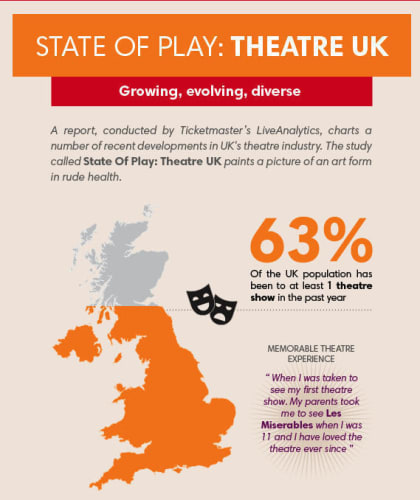Questions and answers
Today Ticketmaster launched a new report about theatregoing habits and trends.
As might be expected it goes some way towards confirming what we already know, or thought we knew, and of the few surprises on offer, none can reasonably be considered game changers.
Does the report bear a close reading then? Well, yes insofar as reports of this nature are few and far between and often not made so openly available across what Deputy Editor of The Stage, Alistair Smith, this morning described as "a data–shy industry".
Theatre sponsors may want to take note that only "One in six have noticed sponsors… the majority of them don’t remember the sponsors specifically… more than half say they rarely notice when an event is sponsored." If this doesn't raise a sponsorship eyebrow, cynical old me would be asking if they could really be supporting art purely for its own sake.
Another poser is if the top criteria for choosing a performance really are content and storyline, reputation and price, why has star casting become so prevalent?
For me the report doesn't say enough about supply and demand – "As a genre, comedy is the most appealing to theatregoers (42%)" the report tells us, but at the same time states that the top three shows (by attendance and preference) are Les Misérables, The Phantom of the Opera and The Lion King, none of which can be regarded as comedies, and tragically (to me) share the same genre.
Saying nothing on obtainability of genre, the report does however comment that "More than half would see the same performance more than once" albeit that "people would rather go to a new performance with limited run or a relatively established performance over a long running performance that’s been going for over 2 years". This it suggests means theatregoers "are more experimental in nature than we might assume". What does that say about the choice offered to the theatregoing public?
The report looks at audience behaviour too; to some extent it reflects a phone–obsessed culture with "Theatregoers between the age of 25 to 34… almost twice as likely to think [checking one’s phone during a performance] as acceptable than the average theatregoer". A depressing one in four theatregoer–respondents admit to have done it at least once and eight out of ten admit to whispering during a performance. As it confirms, "theatre is no longer a preserve of the elite few or a rare special occasion"—familiarity it seems does breed contempt.
The report, of course, could have gone deeper—26% of theatregoers are from London and the South East and likelihood of attendance is also high in this group, but no correlation is made between attendance and availability, whilst parallels are drawn between household income and other yardsticks.
Notwithstanding the interesting points included, two things struck me straightaway as entirely missing from the report.
For all its talk of cost being a barrier to attendance, the report is silent on the topic of booking fees, credit card surcharges and the such like which are often regarded as exorbitant and/or unjustifiable. Not surprising given the body behind the origination of the report, but it makes for an incompleteness which I find diminishing given it enquired about attitudes to the restoration levy added to ticket prices.
The second thing absent from the report is any mention of special needs issues. A trend I have observed in writing for this web site is that theatre listings increasingly include details of captioned, signed and described performances, and autism–friendly adapted performances are being more frequently seen on theatre agendas—and, more importantly, schedules. I accept that no report can be all things to all men, but this is an unwelcome omission.
Setting the omissions aside, the report does make for an interesting and easy read even if it is not dripping gravitas. Let's hope its positive tone and recording of a national theatre "in rude health" doesn't signal to funding bodies that the industry could withstand further cuts.
